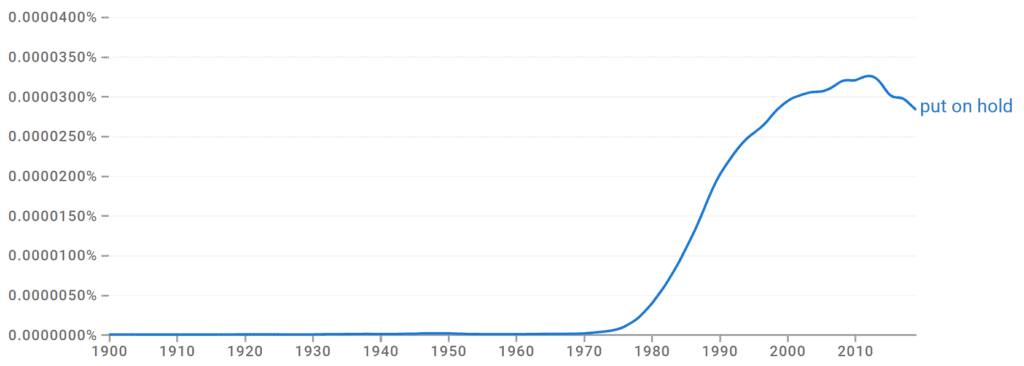To put on hold means to pause or stop something temporarily, although not everything put on hold starts back up again. For example, you might say your plans to invest in a company were put on hold due to economic fluctuations that made the market unstable.
Put on hold is an idiom, meaning it is used figuratively in various manners to express a specific sentiment separate from its original literal usage. Idioms are usually considered informal manners of speech in English. However, learning to use them can help you improve your language skills.
Please keep reading to understand this idiom’s meaning and how to use it in various sentence examples.
Put on Hold Meaning

Put on hold is an idiom that means to delay, suspend, or pause—sometimes indefinitely. To put something on hold is usually done with the expectation that it will resume at some point—although that may not always happen.
The term can be used in various contexts to infer a temporary delay. Some ways it might be used include:
- When you call a company or individual, they might put you on hold. It means they temporarily mute the call or play music/messages while you wait for someone to assist you.
- In a work or project context, putting something on hold means delaying or suspending it for some time. It may be due to a lack of resources, a change in priorities, or the need to gather more information before proceeding.
- If a meeting or appointment is put on hold, it’s temporarily postponed or rescheduled to a later time.
- In finance, putting a payment or transaction on hold can indicate that it’s delayed or pending further review.
How to Use Put on Hold in Sentences
- The project had to be put on hold temporarily due to unexpected technical issues.
- Due to budget constraints, the construction of the new community center has been put on hold indefinitely.
- The airline announced that it would put specific flight routes on hold to cut costs.
- She was excited about her travel plans, but they had to be put on hold when she fell ill and couldn’t travel.
- The teacher had to briefly put the classroom discussion on hold to address an urgent announcement over the intercom.
Should Put on Hold be Hyphenated?
Put on hold is not hyphenated. It’s a phrase made up of three separate words. Hyphens are usually used to connect words or parts of words in some compound terms to indicate modifications. However, put on hold is not typically hyphenated. It’s written as separate words.
This is especially important to remember when the phrase is split to accommodate more information concerning what is being put on hold.
For example:
- The city council voted to put the proposed zoning changes on hold until they could gather more input from residents.
To Put on Hold Origins

The exact use of when the term put on hold became used idiomatically is a bit murky. In a literal sense, its inception is attributed to the term hold the line to indicate that a person was away from the receiver during the early years of telephone use.
During the early 1900s, call lines were shared by more than one household. Some were shared by entire towns! Calls went through a switchboard operator who directed calls to where they needed to go. Asking an operator to hold a line or wait a moment was commonplace.
The expression was changed to be put on hold in the early 1960s. At this time, it was regularly used in the U.S. Space Program when a scheduled space launch had to be suspended—sometimes temporarily and sometimes permanently.
Let’s Review
To put on hold means to pause, delay, or suspend something to address or resume it later. This phrase is commonly used in various contexts, such as phone calls, projects, meetings, appointments, and financial transactions, to indicate a temporary interruption.
Check out some others we covered:
